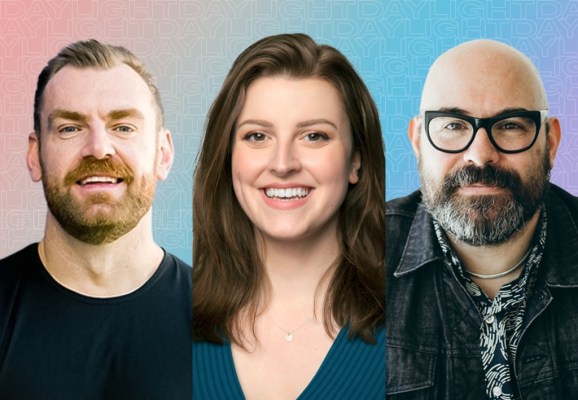Over the past year, there has been a surge of newly formed digital banks aimed at specific demographics. The banks in nearly all cases are trying to meet the needs of certain populations that they believe are feeling left out or underserved by traditional financial institutions.
The latest such neobank to emerge is New York-based Daylight, which describes itself as the first LGBTQ+ digital banking platform in the United States. (There is a digital bank in Brazil with a similar mission called Pride Bank).
Founded by LGBTQ+ entrepreneurs Rob Curtis (CEO), Billie Simmons, a trans woman (COO) and Paul Barnes Hoggett (CTO), Daylight is announcing today that it has secured $5 million in a seed funding round. Kapor Capital and Precursor Capital co-led the round, which included participation from Anthemis Group, Clocktower and Citibank.
Daylight says its mission is to “build a more equitable financial life for LGBTQ+ folks and their chosen families.” The company’s services are targeted toward LGBTQ+ people, their families, and allies — or as Dayilght describes it, “values-based consumers who want to support the queer community.”
The startup, which was founded in 2020, plans to use its new capital mostly to expand its flagship product and lifestyle services, which are designed to improve financial equality and inclusion for the estimated 30-million-plus Americans who identify as LGBTQ+. It also plans to build out a LGBTQ+ business marketplace and a platform that offers discounts and rewards when members shop at merchants whose actions support the queer community.
In an interview with TechCrunch Curtis explained why he believes Daylight is uniquely positioned to help the population deal with challenges such as higher debt accumulation to factors such as pre-existing conditions, lower insurance levels, HIV management needs and [gender] transition costs. At the same time, many members of the community also have lower income levels due to “continued workplace discrimination.”
“LGBT people engage with money really differently and there’s a multitude of reasons for that,” Curtis said. “We spend about the same proportion of our income on discretionary spend, but we’re about 20% less likely to have a savings account, 20% less likely to own investments like stocks, or a quarter less likely to own a mutual fund. And we estimate that only about 30% of our community has any estate planning in place.”
Also, life in general tends to be more costly for LGBTQ+ persons, Curtis believes.
“It is expensive to be a queer person,” he said. “Not only do we find that when we come out to our parents, 40% of us no longer have financial support for things like college and those transitions from childhood into adulthood. We end up with 50% more college debt. We also have increased sexual health costs and some have gender affirming surgery that they need to pay for.”
“By the time we get to our 30s, we will be told ‘you can have one of the following three things: gender affirming surgery, a home deposit or a child,’ ” Curtis added. And, on top of that, having a child is generally more expensive for this population because people either have to adopt or hire a surrogate.
Kapor Capital Partner Brian Dixon believes that the fact that Daylight’s founders have personally experienced problems within the traditional banking industry gives them the necessary insight to help others in the LGBTQ+ community.
One of those problems include friction associated with names on issued cards, which leads to customers being outed as trans. The population also faces a lack of adequate financing products, Dixon believes, for things such as surrogacy, IVF, adoption, transition support and mental health.
“Many neobanks do not provide a truly unique banking experience that will result in a mass exodus from traditional banks,” Dixon said. “Daylight has an opportunity to be the outlier, especially given their focus on community. Daylight’s unique features include a seamless card issuance process that allows trans and non-binary customers to order a card in their preferred name, book sessions with expert LGBTQ+ financial coaches, get peer-to-peer advice from their digital community and earn rewards that are meaningful to the LGBT+ community.”
Daylight will offer features such as a checking account, the ability for members to get paid two days early, free ATMs and “no hidden fees,” according to Curtis.
“I think that payday early is really important because we know that there are high rates of credit card declines for folks who are buying hormones,” he said.
Another feature the Daylight platform offers is personalized recommendations to members which alert them when they’re spending money with merchants that support anti-LGBTQ+ politicians and initiatives, a practice known as “rainbow washing.” It will also offer alternative merchants that it says are “more aligned with the community’s values.”
“LGBTQ+ consumers, and those that support them, are very intentional about where they spend, but it’s difficult for an individual to know whether they’re spending in line with their values, or inadvertently shopping with brands that engages in rainbow washing while funding politicians and projects that work against our interests,” Curtis said.
Daylight is currently in beta but already has “thousands and thousands” of customers on its wait list, said Curtis, who estimates that it will have 10,000 customers by the time it launches in October.
Other digital banks targeting specific demographics that have raised funding over the past year include Fair, a multilingual digital bank and financial services platform that recently launched to the public after raising $20 million in 40 days earlier this year. Others that have emerged include Greenwood, First Boulevard and Cheese.
